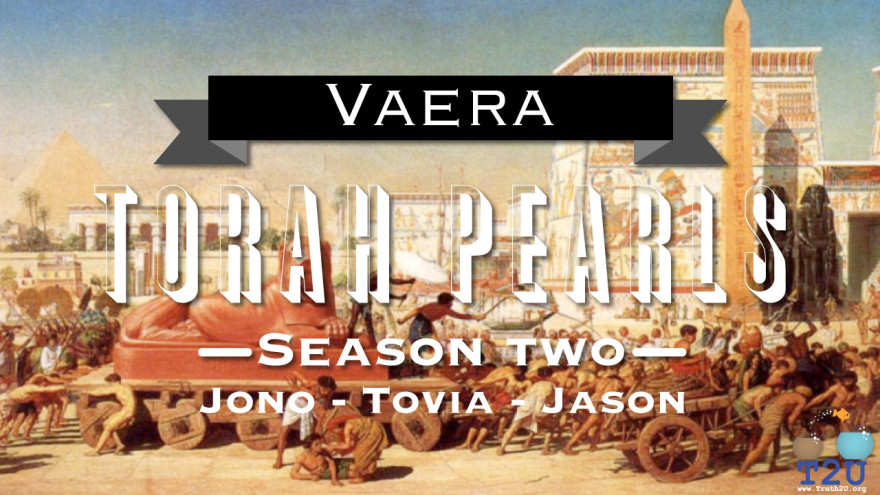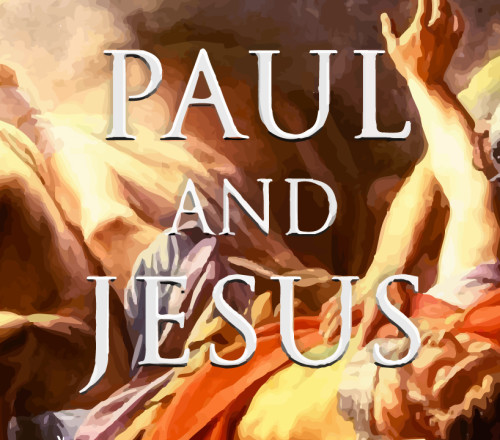Torah Pearls – Season 2 – Vaera – Rabbi Tovia Singer, Jono & Jason
Did the patriarchs know the name of God? In what capacity was Aaron Moses’ Prophet? Did God harden Pharaoh’s heart and if so does Pharaoh have free will? Why was Pharaoh in the river early in the morning? The answers to these questions and more in this week’s Torah Pearls!
Tovia Singer – Passover Perspective
Join us for this year’s Tanakh Tour of Israel!
[karma_by_kadar__simple_player title=”Truth2U” src=”https://truth2u.org/wp-content/uploads/Audio/Truth2U%20-%20Torah%20Pearls%20-%20Season%202%20-%20Vaera.mp3″ volume=”0.9″ autoplay=”true” downloadable=”true” color=”1″]
[wp-post-slider]





Again… Informative and spilling over with truth! Not only is your commentary of the portion clear, but also exciting to listen to… Week after week I can’t wait to tune in!
Thank you, Rabbi Tovia for answering my question =) (Jono, you were much more eloquent in posing my question than, I was. Thank you)
I was really enlightened this week. For years it bothered me that God was “hardening” Pharaoh’s heart. I thought, what a cruel God! When I was a Christian, I thought his free will was taken away because he was evil and had no choice in the matter. Which in Christianity, makes a person have the need to have this ability to choose; which Jesus only gives. Now even more so proves to me that there is no need for Jesus since it was not ‘hardened’ but ‘strengthened.’ It makes so much sense!!!
Jono, I have not experienced a “plague” of frogs, but soon I shall have a frog symphony because I have a pond in my pasture.. I will record it and post it 😀 I think it is beautiful, however I would not want to experience a frog plague where they are in everything!
Jason, I love your skippy bits:D
I appreciate you guys tremendously!
Highly informative and detailed teaching. Please keep up the good mission. Thank you Jono, Tovia and Jason!
We are enjoying your show coming to our home every week. Aaron did not have to be saved as Moses did. Does that mean that the baby boys killing started about the time of Moses birth? What was the time frame of the 10 plagues? A year, months? When the water turned to blood, how did Pharaoh relieve himself for the week?
Enjoyed your teaching as always. Rabbi Singer your insights are “delicious”!
Can you guys expand on why Elohim is plural when referring both to many gods and to Yah? It has been a difficult topic to get my mind around. Does Elohim mean something totally different or more precise than “god”? Sometimes you see it alone, other times partnered with יהוה.
Thinking about Pharaoh… You did piece together an answer to a question that I’ve had. I can see now that Pharaoh always had the ability to choose, but he was also self-chained (and encouraged by being the object of worship) to his own false pride. He could choose to be free of those chains each time he endured consequences, but he valued his false pride over freedom. Being forced to choose between the two went against his comfort and very well might cause the result of a hard heart. He wanted both freedom and falsehood.
Looking up the word
hardened ויחזק, I see it translated as retained,
prevailed, encouraged…
Perhaps, as you guys touched on, Yah was highlighting something that Pharaoh voluntarily and lovingly held on to that was also killing him. Every time the pharaoh was asked to let it go, he “encouraged” his own heart to keep the lies (about himself, his godhood, his power and his place in the world) against his own reason and to his own, his people’s and his land’s detriment.
Just speculating, but perhaps Egypt would never have survived themselves if such evil had continued without Yah showing up. Or perhaps they would have survived over time, but living a life no one would want to live.
Thank you again for answering my questions and this wonderful discussion with its crescendo at the end when Pharao finally repented! Never understood the real meaning of the event with a mere man, thinking himself a god, trying to compete with the Almighty. A rude awakening.
Jill, in Hebrew one word alone does not make it plural or singular.
To know if a Hebrew word is singular or plural it must be in a sentence where:
It receives a plural suffix;
It receives a plural verb;
It receives a plural adjective.
The ים ending alone does not make a word plural. Elohim ends with the masculine plural suffix “ים” (“im”). But to know if the usage is singular or plural the verbs / adjectives must also be plural.
So, just as not every word in English that ends in “s” is a plural, not every word in Hebrew that ends with “im” is a plural. Here is a sample:
aqlim (climate)
naftulim (a struggle)
pnim (an interior)
qadim (east, an easterly wind)
tsanim (a dried slice of bread)
There are also quite a few Hebrew names that end with “im”, and they don’t represent a plural entity, and here’s a sample of those:
Hayyim
Elyaqim
Ephraim
Yehoyaqim
Yerushalayim
The Hebrew word elohim, is often used as a title for God—but not always. It can also mean powerful / important men or rulers/leaders (as in B’réshıt / Genesis 6:3 and 6:4, T’hillim / Pslams 82:6). It is translated as “judges” in Sh’mot / Exodus 21:6, 22:7, 22:8. Elohim can also refer to “gods” (i.e. idols). In all of these latter cases, its verb indicates the word’s plurality—but it never has a plural form verb when it refers to G-d. Just look at B’réshıt / Genesis chapter 1:
in verse 3: vayomer elo-him (“and G-d said”)—not vayom’ru (the plural inflection “and they said”);
in verse 4: vaya’r elo-him (“and G-d saw”)—not vayir’u (the plural inflection “and they saw”);
also in verse 4: vayavdél el-ohim (“and G-dd divided/separated”)—not vayavdilu (the plural inflection “and they divided/separated”);
in verse 5: vayikra el-ohim (“and God called”)—not vayikr’u (the plural inflection “and they called”);
and again in verse 5: kara (“He called”)—not kar’u (the plural inflection “they called”).
Can I ask you not to use the term that you used for G-d in your post? Thank you.
Although it is not my intention to offend, I do understand that the way I expressed myself, regarding the name of my god, resulted in such. It is my firm belief that we should be judged based not upon intention alone, but on how our decisions impact others. Avoiding damage to the greatest of our abilities should be a goal.
Having said that, however, I can no more relegate the god, who knows me, to a nameless, faceless box than I can ask another to disregard the authorities accepted into their lives regarding their relationship with him.
Seeking what is true requires an amount of fluidity. Change can only come as a result. The walk may be painful at times. If we are to grow and learn, a mutual respect is essential. As people stumble along the way, requesting of them to be where another is and to have the vantage point that another has is an exercise in futility. Patience is required as the desired destination is the same for both and neither has reached it.
There is a precedence, reason and value behind the words that I choose, as I am sure there is with everyone’s. I reserve the right to express myself as I see fitting to the situation and I acknowledge your right to do so as well. I will do with integrity and with as much respect as possible.
I heavily considered the request. My respect and my value of the input I received have not diminished. I see that everyone is working alongside one another to understand everything fully and to find what is good, right and untarnished. In weighing the harm in fully honoring what is being asked of me versus the consequences of disregarding it, I can only amicably agree to disagree. I cannot, in good conscience fully observe it at this time. I wish everyone peace in all that you do. Shalom.
~jill
Shalom! thanks for this midrash, i always wondered how Aaron could lead people to sin by allowing the worship of the golden calf if he was a prophet! he was just an interpretor a mouth piece of Moshe, so when he was not there he was speaking and making his own decisions! many thanks to Tovia Singer